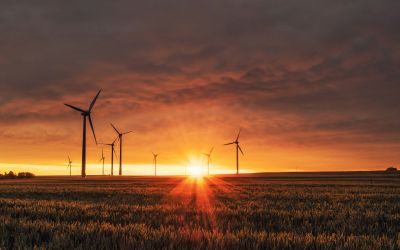Interview with Kari Kankaanpää, Senior Manager of Climate Affairs at Fortum
Climate Action had the pleasure to talk with Kari Kankaanpää, Senior Manager of Climate Affairs at Fortum, the Helsinki based leading clean-energy company ahead of its participation at the 8th Sustainable Innovation Forum, taking place alongside COP23 in Bonn Germany, 13-14 November.

Climate Action had the pleasure to talk with Kari Kankaanpää, Senior Manager of Climate Affairs at Fortum, the Helsinki based leading clean-energy company ahead of its participation at the 8th Sustainable Innovation Forum, taking place alongside COP23 in Bonn Germany, 13-14 November.
Fortum is active in multiple sectors across the sustainability spectrum. Do you want to make an introduction to the company?
Fortum is a leading clean-energy company that provides its customers with electricity, heating and cooling as well as smart solutions to improve resource efficiency. Our vision – For a cleaner world – defines our ambition to produce ever-cleaner electricity and heat, use renewable energy sources efficiently, preserve natural resources, and promote the circular economy. We want to engage our customers and society to join this change for a cleaner world.
We employ some 9,000 professionals in the Nordic and Baltic countries, Russia, Poland and India. Fortum is the 3rd largest power generator and the largest electricity retailer in the Nordic countries. Globally, we are one of the leading heat producers. As two thirds of our power production is hydro and nuclear, Fortum is also among the lowest-emitting generators in Europe. In 2016, 62% of our electricity generation was CO2 free.
Fortum is very experienced in co-generation, providing both electricity and heat. What do you think the role of co-generation technologies in the climate action context will be?
Scarcity of global natural resources means that efficient energy production and use of energy are increasingly important. Combined heat and power (CHP) production addresses both of those issues: over 90% of the fuel's primary energy is used to produce district heating and electricity. Compared to separate production, co-generation also reduces greenhouse gas emissions by 25-40%. The efficiency and operational economy of CHP plants allows for flexible use of various energy sources.
Most of our CHP plants are located in urban areas where there is a significant demand for district heating. Many of plants have been equipped with an additional condenser that enables increased electricity production in the summer when heat production is at a much lower level.
Renewable energy technologies have gained a momentum that can only go forward. How do you envision the clean energy future? Will renewables be sufficient?
At Fortum we envision the clean energy future as an emissions free energy production system with high overall efficiency. In this system, wind and solar will be mainstream and there will be a high degree of decentralised production and large amount of flexible storage (short-term and seasonal). The transition to this future energy system is already ongoing, but it will still take time.
Transition challenges security of supply and investments are required in flexibility, storage and transmission. To solve the seasonal security of supply in a cost efficient way, fossil production assets will have a transitional role as important sources of flexibility. Flexible assets, like hydro power and gas, will have an increasingly important role in the future energy system as sources of balancing the intermittent renewable production. As the transition is proceeding, we will move from scarcity mainly in energy increasingly to scarcity in capacity (security of supply, flexibility). All CO2 free energy sources will be needed – in addition to renewables also nuclear energy plays an important role.
Circular Economy Village in Riihimäki received the Climate Deed of the Year award Sustainable Development Forum of Finnish Energy. What did you want to achieve through this project?
The Circular Economy Village is a pioneer in future waste management. We want to introduce this concept to help in reaching the increasing material recovery targets of waste. The source separation of waste is ultimately the best way to support quality recycling, but the coverage and results reached by this has been proved limited.
The Circular Economy Village in Riihimäki consists of mechanical and automatic sorting plant of mixed waste, the Eco Refinery, an automated sorting and recycled plastic manufacturing plant, the Plastic Refinery, and the Bio Refinery, which produces biogas. The biowaste will be turned into biogas and fertilisers, and the plastic and metal into recycled raw material for industry and non-recyclable energy fraction into waste-based fuel to CHP plants. The reject will be used to generate electricity and district heat in our waste-to-energy plant, which is connected directly to the sorting plants.
What is the role of the public sector in promoting Circular Economy?
New circular economy models will need strong regulation and commitment of public actors to proceed, at least in the beginning. Businesses play an important role in delivering innovations and services.
You are a Gold Sponsor of the Sustainable Innovation Forum, during COP23. What was your interest in getting involved in the Forum?
As a leading clean-energy company Fortum wants to be involved in SIF where policy makers, regulators, commerce and industry and civil society meet. We want to support the low carbon development in general, but also to learn how the market is moving. We want to present our solutions, products and services to help our customers mitigate their carbon footprint towards the future sustainable energy system. We look forward to networking and interesting exchange of information in Bonn.
Fortum is a Gold Sponsor in the 8th Sustainable Innovation Forum, taking place alongside COP23, in Bonn, Germany, 13-14 November. Pekka Lundmark, President and CEO of Fortum Corporation will be joining the opening panel of the Forum on Accelerating the Energy Transition. The Forum brings together 600+ carefully handpicked delegates, including : Ministers of Energy and Climate Change, Blue Chip CEOs, Mayors and more for two packed days of capacity building, networking, collaboration and deal making that will galvanise and fast track the green economy.
To find more about the topics, the agenda and more, click here http://www.cop-23.org/


_400_250_s_c1.png)



